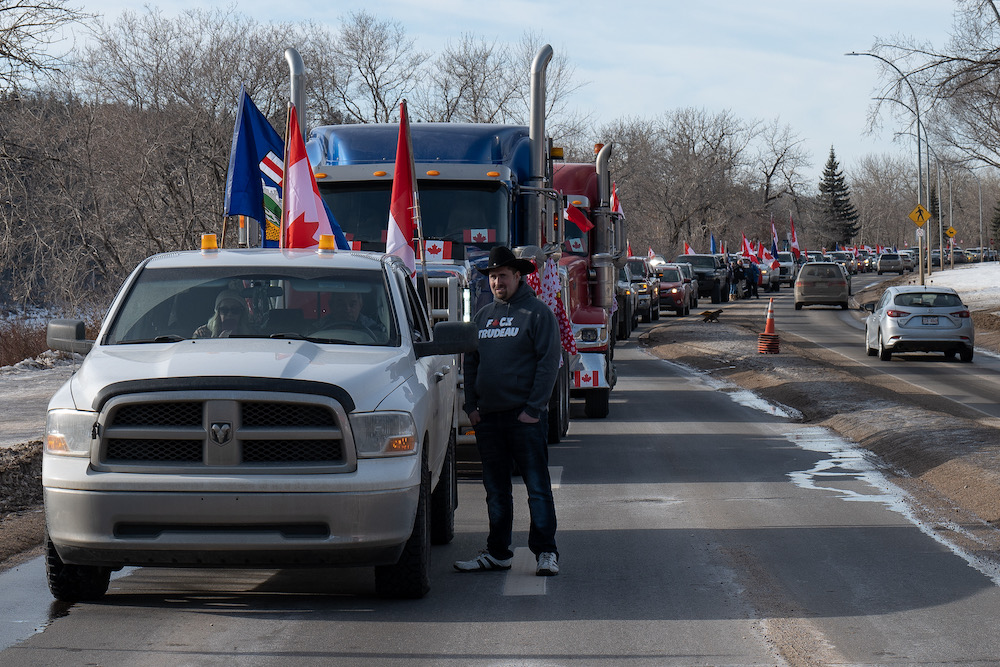The Canadian government has invoked the Emergencies Act. Do you know where your trucks are?
If you don’t, and you run a trucking company, you might want to check.
As Deputy Prime Minister Chrystia Freeland said Monday, “if your truck is being used in these blockades, your corporate accounts will be frozen. The insurance on your vehicle will be frozen.”
That seems clear enough.
Prime Minister Justin Trudeau called the afternoon news conference at which Freeland spoke Monday to announce the imposition of a public order emergency under the Emergencies Act.
He vowed the emergency will be used to end the blockades on the Canadian border and the occupation of Ottawa by participants in the so-called “Freedom Convoy” that was foolishly allowed to roll into town on Jan. 29 by a negligently inattentive Ottawa Police Service.
Most Canadians will heave a sigh of relief, even if Canada’s Conservatives try to spin this as an outrage against freedom without sounding too much like they’ve crawled into bed with a mob of people bent on wrecking the economy and holding citizens of the nation’s capital hostage in support of a large number of ill-defined and fundamentally anti-democratic goals, including overthrowing a recently elected government.
Newspaper editors itching to publish headlines saying “like father, like son,” as social media gadfly Nora Loreto suggested they probably would, were disappointed.
This was no just-watch-me moment like Pierre Trudeau, barely suppressing his fury during the October Crisis of 1970. Indeed, it was a pretty restrained performance in most regards.
Justin Trudeau said the measures adopted under the act—which was passed in 1988 by Brian Mulroney’s Conservative government to replace the War Measures Act employed by the PM’s father during the terrorist kidnapping crisis the roiled Quebec in 1970—were confined to locations where disruptions are taking place and “reasonable and proportionate to the threats they are meant to address.”
Naturally, there will now be a great deal of criticism that Trudeau has overstepped his bounds, and plenty of more thoughtful analysis later. By and large, though, while the latitude granted by the law is great, the measures adopted seem commensurate with the crisis.
Conservative leaders who demanded a harsh response to the rail blockades in Feb. 2020 with the claim they threatened the national economy seem to have been blithely unconcerned by the potentially far more serious economic impacts of the blockades of Feb. 2022—at least until they realized being seen serving coffee to a mob of lawless goons with sinister foreign connections squatting on Parliament Hill was not a good look.
Since foreign and domestic funds for the disruption came via crowdfunding platforms and used cryptocurrencies to evade measures to track spending on criminal activities, Freeland’s announcement of the emergency extension of those rules is likely to seem logical to most Canadians too.
“The illegal blockades have highlighted the fact that crowdfunding platforms, and some of the payment service providers they use, are not fully captured under the Proceeds of Crime and Terrorist Financing Act,” she said. “We know that these platforms are being used to support illegal blockades and illegal activity which is damaging the Canadian economy.”
This will also present an interesting conundrum for the federal Conservatives and their United Conservative Party brethren in Alberta, since both parties have lately been touting the dubious benefits of cryptocurrencies, which seem primarily to exist to facilitate crime, create dark political money, and avoid paying taxes.
The government promised it would make the new regulations permanent by passing legislation when the state of emergency is lifted.
In a Monday news conference on an unrelated topic, a seemingly rattled Alberta Premier Jason Kenney, just off his conference call about implementation of the Emergencies Act with the PM and other premiers, complained that “we don’t believe this is necessary in Alberta. It could actually be somewhat counterproductive.”
Having done nothing for more than two weeks while the Coutts blockade cost Albertans close to $50 million a day, he must know the revelation the blockade was harbouring a cadre of heavily armed men primed for a potentially deadly shootout with police makes him look derelict and irresponsible.
RCMP arrested 13 people and seized an arsenal of high-powered weapons and ammunition at the Coutts blockade Sunday night.
If Trudeau’s gamble that using the Emergencies Act will be enough to send the far-right insurrectionists home to think again pays off, Kenney may realize that even if his truckling to the blockaders gets him past his April 9 party leadership review it may not go down well with Alberta voters in his next electoral test, the general election expected in 2023.
And the Emergencies Act seems to be working in Coutts. Reports from the scene on Monday night suggested blockaders were climbing in to their rigs and bugging off home as quietly as possible to await their personal visits from the Mounties.
Meanwhile, Kenney is not paying much attention to running Alberta these days.
On Monday, it was revealed that his chief of staff, Pamela Livingston, will be taking a leave of absence to work full time on the campaign leading up to the April 9 vote.
Out of time to stall, Kenney announced Mar. 15 as the by-election date in Fort McMurray-Lac La Biche in which former Wildrose Party Leader Brian Jean has been nominated as the UCP candidate on a platform of unseating and replacing the premier. (The premier blamed the Omicron variant of the COVID-19 virus for the delay at his second news conference Monday.)
Presumably this means we can expect more erratic nonsense like Kenney’s irresponsible diversionary effort yesterday to wind-up anti-vaxxers to head to the offices of the Alberta Federation of Labour and protest its support for keeping COVID-19 protections in schools until the fifth wave eases, and his bizarre claim Calgary Mayor Jyoti Gondek called him a “potlicker.” (Politicker, surely!)



